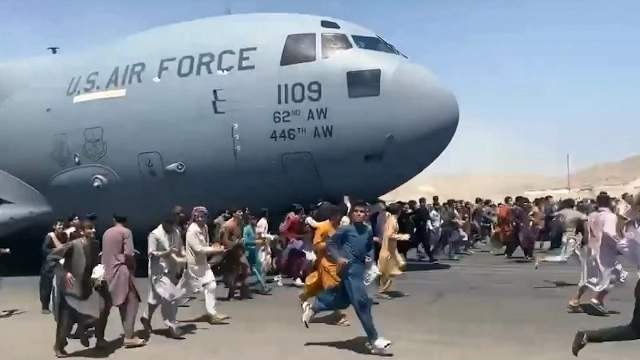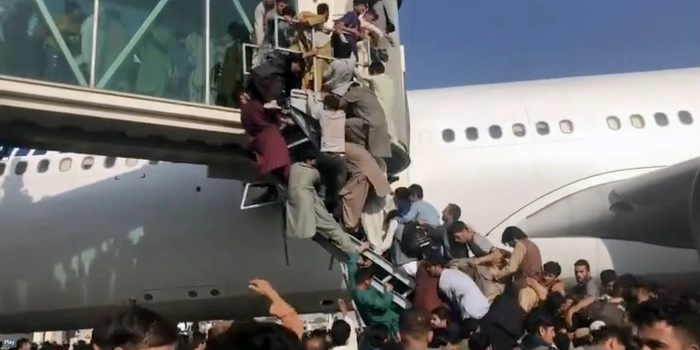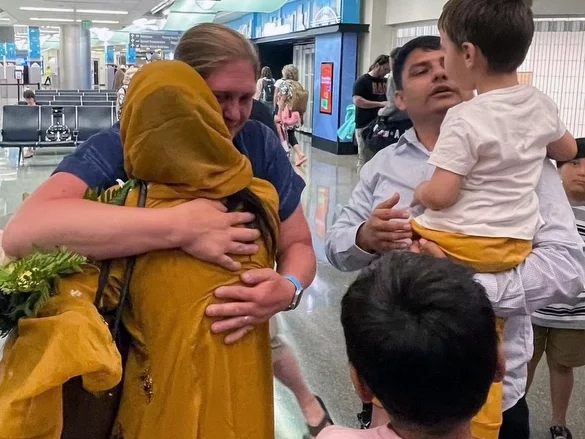After the Afghanistan government collapsed, the refugees escaped to Iowa.

In August 2021, Fardin Ameer Karimy arrives in America. His first stop—the Fort Bliss army post in El Paso, Texas. In the middle of a windy desert, the sand drifts into the flimsy camp. In a bed littered with cockroaches, he lies among scattered bags that belong to those evacuated like him. In the night as Karimy sleeps, his mind wakes. He thrashes in his nightmares, in the sounds of gunshots and the screams of Afghan people.
During the day, he fears for his family that remains unsafe back in Afghanistan. He waits in the refugee camp at Fort Bliss, away from his family, with a broken phone, in a country where the language is foreign. Amongst all the families, and about 10,000 other Afghan people temporarily housed, he’s alone. A resolve torn down, his voice unable to speak.
But after the first month of waiting, he remembers what his mother tells him: that hardship will pass.
After all, Karimy is no stranger to struggle. As a child he sold eggs with his little brother to put a piece of bread on the table when his father became disabled for a couple years. When he was a young boy, he learned his role as the man of the house. As an adult, he will carry himself now as a man. So, with a changed mind, he decides to take the first step.
He approaches a group of soldiers playing soccer and football with the refugees. And with the help of the Afghan interpreters, he asks them to teach him English words and phrases. Progress is slow, but it starts.
He spends three months like this, until he makes his way to Iowa.
When the homeland falls
On August 15, 2021, the government of Afghanistan collapsed.
The Taliban entered the capital of Kabul, and the civilians were left to flounder. Former President Ashraf Ghani fled, and the army disintegrated. It happened just over two weeks before the official withdrawal of U.S. troops, announced by President Joe Biden that ended a two-decade war–the longest in American history.
“We lost our hopes, freedom, freedom of speech, freedom of human rights,” says Shir Agha Safi, executive director of Afghan Partners in Iowa. “In one day, we lost our dignity. We lost all honors that we held dear to us.”
Like a grain of sand drifting through a storm, Karimy rushed in a sea of thousands and thousands of people through Kabul. Many escaped from other provinces, all desperate to catch a plane. The Taliban shot through the air in an attempt to disband the crowd and wreak panic. Karimy arrived with three of his brothers at the airport gates and spent a day and a night waiting.

But at about 9 a.m. the next day, the Taliban struck. They ambushed the civilians with canes and sticks, beating them as the American soldiers scrambled on the other side of the gates. They let through people with passports and green cards, but Karimy and his brothers had neither. A Taliban fighter punched him across the face. They proceeded to beat him with their guns until he nearly fainted, blood dribbling down his nose.
Witnessing the harrowing sight, an American soldier yanked him inside the gate. And for five days, he waited in the airport, but his brothers were left behind.
“I’m really grateful to be alive,” Karimy says. “I’m worried and concerned about my family and all the Afghanistan people left behind and have nowhere to go.”
Unshowered, with a broken phone, and a swollen arm, he finally boarded a flight. He journeyed from Kabul to Dubai, then boarded a different plane to go to Spain. At the Madrid airport, the refugees were welcomed. He got food, water, a toothbrush, and shampoo. But that night, he could barely sleep. The next morning, he sought medical help for his arm, and after nine days of no contact, a phone was brought in for the refugees to reach their families.
After five days in Spain, he flew to Germany. For seven days, he endured time in a refugee camp with more than 10,000 people. The nightmares continued, and hopelessness plagued his mind. The lines for a mere piece of bread and two apples stretched for three to four hours, and it brewed a deep-seated humiliation inside him.
He took a plane after that to the camp in El Paso, and after a few months, relocated to Iowa.
En route to Iowa
In the dead of the winter—wearing a pair of jeans, sandals, a shirt, and a zip-up jacket—Karimy arrives in Iowa. He waits for a place to live in a hotel. That’s just how things go, when refugees arrive. They get assigned to a resettlement agency, and a case manager supports them for 90 days.
But like a rainstorm, the Afghans pour into Iowa all at once.
“We all saw the images on the news of the people clinging to planes and overfilled planes leaving Afghanistan,” says Erin Bell, a volunteer with nonprofit Des Moines Refugees Support. “And it seemed like a world away. But before we knew it, they were literally on our doorstep, needing help here.”
Now, the state is no stranger to welcoming refugees. In 1975, former Iowa Gov. Robert Ray created a refugee resettle program for Vietnamese immigrants. However, after the Trump Administration made the plight to strip down the U.S. refugee system, in the face of rapid evacuation, there is nothing.
In a scramble to set up an infrastructure, the Afghans fill extended-stay hotels. They lack food, hygiene supplies, and winter gear. Families would call those like Bell at 10 p.m. with nothing to eat and no diapers for their children. Bell was prone to midnight runs, and for a year and a half, the volunteers functioned in crisis-mode. They’d communicate with supporters on their Facebook page and give honest retellings on the poor conditions of these hotels.
In this chaos—where they feel forgotten by resettlement agencies—the Afghans have 90 days to become self-sufficient.
“They were all waiting for those permanent housings, but their 90 days were going that entire time. Sometimes, it’s way past the 90 days,” Bell says. “We took a lot of heat from the resettlement agencies. We were very upset.”
Again, for Karimy, three months.
He lives in a hotel room, deals with a rude caseworker, and waits a whole month for a new phone. But one day, he meets a woman he’d come to title the “angel of Iowa”: volunteer Emily Kresowik. He meets her simply while walking on the street when she stops her car to hand him a coat. The next day, he sees her again in the parking lot from his hotel window alongside another Afghan man handing out coats and boots to people. And in that moment, his life changes.
The Afghan man acts as an interpreter that allows Kresowik and Karimy to communicate. Kresowik learns how long Karimy’s been in Des Moines, and that he’s the same age as her son. She decides to become his advocate and continues to help him over the next six months. He meets her family, people of the Des Moines community, and members of the Des Moines Refugee Support. With their help, he learns the basics—enrolls in an online English class, how to navigate the city with a bus, the medical system, and how to drive. They show him the cultural differences and welcome him into their homes when he feels alone.
“Honestly, I don’t believe how far I’ve come,” Karimy says. “I learned about culture, I learned the language. I never drove in my country. I usually use a bus because buying a car is not easy…so learning how to drive, and learn how to live. When I look back, it’s like—wow.”
Three months pass and his case worker finally finds him an apartment.
His progress persists, now in bigger steps.
To build a community
A singular moment prompts Safi to build the nonprofit Afghan Partners in Iowa. It happened when he was new to Iowa, about to cross the street.
For 12 years, Safi served in the Afghan Army as a security forces officer. He evacuated from Kabul when the Taliban invaded and arrived in the U.S. on August 31, 2021. And now he finds himself in Iowa, about to cross the street, standing next to a fellow refugee. The rules of traffic unbeknownst to him, the man crosses—and he dies when a car hits him.
“That gave me senses of getting involved again,” Safi says. “To lead our community here because he survived a horrible war in Afghanistan and came to the United States. And just for not knowing the rules of traffic…he died on a street in a peaceful country.”
So with the help of the Des Moines Refugee Support, coalition Refugee & Immigrant Voices in Action (RIVA), and the Drake Legal Clinic, he builds his nonprofit from the ground up. They assign him an advisor who comes all the way from Spain, hires staff members, and applies to a few grants, which get approved. His advisor mentors him through strategic planning. And now they are a core team of six people with the initiative to help the Afghan community.
There is no limit to the help they offer. When an Afghan family or person relocates to Iowa, they reach out to Safi or the family navigator Fahima Rahimi. They ask the refugees basic questions to gauge their exact situation and deduce what needs to be done. Whether it’s immigration paperwork, getting a driving permit, or helping kids vaccinated to attend school, they will help.
“When I wake up in the morning, I’m very proud to come to the office or go visit community members wherever they need to go,” Safi says. “I’m very grateful that there is an opportunity. I’m still serving my people.”
According to Safi, there are about 1,250 Afghans now in the state. About 500 are with family, the rest on their own.
The weight of home lingers
But with greater heights, comes great pressure.
“The people of Afghanistan, they fought alongside the U.S. forces in Afghanistan and all those special forces and commandos,” Safi says. “They’re left behind in the country, and the Taliban are still killing them.”

Because even in America, they cannot escape the terror. Safi’s parents and siblings are back in Afghanistan under threat from the Taliban and living in isolation. In Iowa, he witnesses struggle every day and feels the weight of the trust that his people here bestow on him. Just recently, he visited an Afghan woman, and in the final stages of cancer, she held his hand. Her trust towards him unwavering, she made him promise to take care of her daughter in her wake.
“Sometimes, I’m afraid I will be weakened,” Safi says. “I will not be able to hold that trust of my people that they have on me. I really want to reach every one of them and do whatever I can.”
And Safi wants to reach farther with Afghan Partners in Iowa. He wants to turn it from being community-based, to the state level, and then international in order to help those left behind. The organization has goals to operate in Afghanistan and America and receive funding from European countries too. There are changes he wants to bring. The girls in Afghanistan need education. It’s banned for them back home. They do not have access to jobs and struggle to purchase hygiene products.
Back home, Karimy was the principal of an all-girls school. He was told when the Taliban invaded Kabul that they needed to close the school and send everybody home. Pandemonium ensued. The girls started to cry in fear of getting killed. He fears for his family, his little sisters living in a home that resembles jail.
“I worked in [the] education system in Afghanistan, and I want to work here in some place—I want to help,” Karimy says. “I know [six] languages…and my community needs somebody if they want to talk with the school system or to the community.”
They need a voice. And that leads him to the role as a family liaison for Des Moines public liaisons, a position he’s held for a year and a half now. He supports his family and sends the money he earns back to them in Afghanistan. In the future, he wants to complete his education—he was in nursing school when the Taliban invaded. Karimy is now a green card holder, and when he becomes a citizen, he can apply for his parents and siblings to come to the U.S.
And if faced with a reflection of his old self, the trembling man in August of 2021, he’d tell himself one thing—keep going.
